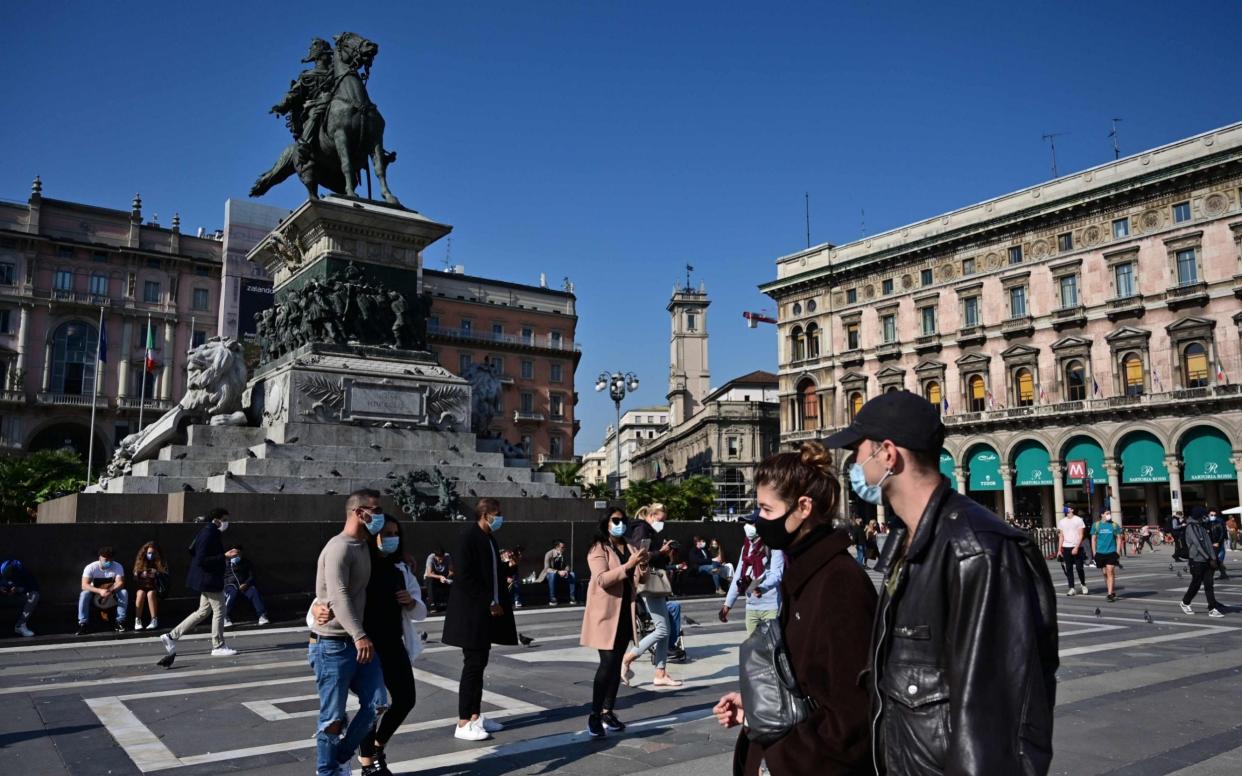Italy 'to close high schools' as second coronavirus wave sweeps Europe

Italy is considering a nationwide curfew and closing high schools after the country reported its highest every daily toll of coronavirus infections as the second wave of the pandemic swept Europe.
New measures were introduced or are expected against the resurgent virus in other European countries as records for infection numbers were broken across the Continent on Saturday.
Italian authorities meet this evening to discuss the measures, which would close cafes and restaurants from 10pm and compel people to return home. More than 10,000 coronavirus infections were reported in Italy on Friday.
Cinemas could be closed and football matches, both professional and amateur, are expected to be banned. Only emergency or essential travel will be allowed, under the new rules, according to media reports in Italy.
The national measures, which include a push to increase working from home, will form a baseline on which regional governments can build, especially if they are in high contagion areas.
Lombardy, Italy's most populous region, has once again become the most affected in the Covid-19 resurgence, adding more than 2,000 infections a day. Hospitals intensive care units are coming under strain.
The northern region, where the European coronavirus outbreak began in late February, has already limited bar service and alcohol sales, banned contact sports and closed bingo parlors.
The new measures allow only table service for bars from 6pm, ban takeout alcohol sales from that time and prohibit drinking in public spaces, an effort to eliminate crowds from forming in piazzas with takeout drinks.
The regional government late Friday also called for high schools to adopt hybrid schedules, with students alternating in-person with online learning.
Italy's other hardest-hit region, southern Campania, has taken similarly strict measures, including a shutdown of schools for two weeks. After parents protested, the regional governor backed off Friday and allowed daycare centers to remain open.
The Vatican said someone who lives in the same hotel as Pope Francis has tested positive for coronavirus, adding to the 11 cases of Covid-19 among the Swiss Guards who protect him.
Chancellor Angela Merkel urged Germans to come together like they did in the spring to slow the spread of the coronavirus as the country posted another daily record of new cases.
The country's disease control centre reported 7,830 cases overnight, a new record, on Saturday.
Mrs Merkel urged Germans to avoid unnecessary travel, cancel parties and remain at home whenever it is possible.
"Difficult months are ahead of us," she said in her weekly video podcast. "How winter will be, how our Christmas will be, that will all be decided in these coming days and weeks, and it will be decided by our behavior."
On Saturday, Sophie Wilmes, Belgium's foreign minister and former prime minister, announced she had tested positive for coronavirus.
Belgium announced plans for a month-long nationwide curfew from midnight to 5am and the closure of all cafes and restaurants on Friday night.
A ban on alcohol sales past 8pm and a limit of one non-family “hug friend” per person was imposed and Christmas markets cancelled.
In Paris and eight other French cities, restaurants, bars, movie theaters and other establishments were being forced to close no later than 9pm to try to reduce contact among people. The country was deploying 12,000 extra police officers to enforce the new rules.
The Netherlands, which entered “parital lockdown” on Wednesday, hit a new record for daily coronavirus cases on Saturday, with more than 8,000 infections in the past 24 hours. Bars and restaurants are closed and no alcohol can be served after 8pm.
In the Czech Republic, the number of new infections surpassed 10,000 for the first time, surging to 11,105 on Friday, the Health Ministry said. That was almost 1,400 more than the previous record set a day earlier.
Austria on Saturday reported 1,747 coronavirus infections in the past 24 hours, a new record.

